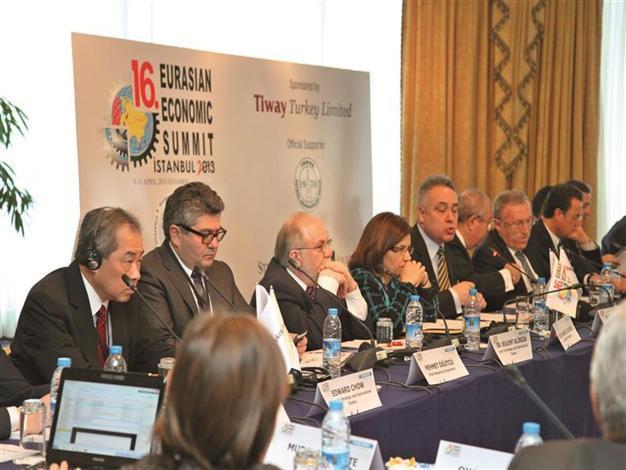Apology, Cyprus hinder Israel’s Turkey gas bid
ISTANBUL - Hürriyet Daily News

Courtesy of Marmara Group
The normalization of Turkish-Israeli relations – which is contingent on the latter apologizing and paying compensation over the deadly 2010 Gaza raid – would not be enough to effect energy cooperation between the two due to Israel’s energy cooperation with Greek Cyprus, according to a Turkish official.
The revelation emerged yesterday during the 16th Eurasian Economic Summit's Energy Search meeting in Istanbul in which Michael Lotem, the Israeli Foreign Ministry’s special envoy for energy, attempted to approach Akkan Suver, the head of conference organizer the Marmara Group (MG) Foundation, with a request to discuss possible energy cooperation with Deputy Turkish Energy Minister Murat Mercan.
But according to sources speaking on condition of anonymity, Mercan refused to speak because Turkey had downgraded its diplomatic relations with Israel to a minimum because Israel had killed nine Turks on board the Mavi Marmara aid flotilla, which was trying to break the Israeli blockade on Gaza in 2010.
Mercan, however, later agreed to speak informally at a coffee break following the conference’s “Natural gas as the game changer” session. Replying to Lotem’s questions as to the possibility exporting Mediterranean gas via Turkey, Mercan replied that even if Israel fulfilled Turkish demands for getting relations back on track, namely, providing an open apology for the Mavi Marmara killings, compensating the families of the victims and ending the blockade on Gaza, the problem of Israel’s resource cooperation with Greek Cyprus would still remain.
Turkey could be a natural energy cooperation partner for Israel because potential gas finds off Israel’s shore could find a market in Turkey and Europe. Before the Gaza crisis, Turkey and Israel had been in detailed talks for regional energy cooperation, including constructing pipelines between them through the Mediterranean.
The problems related to Greek Cyprus stem from 2012, when Nicosia declared parts of the Mediterranean as its economic zone for oil and gas exploration and extraction, including territorial waters claimed by the Turkish Cypriot government. The declaration prompted the Turkish government to announce that it would not do business with any country or company that entered into a Greek Cypriot ventures.
Other sources speaking on condition of anonymity, however, said the exchange was not a negative one since it clarified Turkey’s position, indicating which parties companies intent on investing in Israeli projects should not cooperate with while providing guidance to Israeli political parties, which are set to begin coalition talks following Jan. 22 elections.
Mercan used to be the head of the Foreign Relations Committee of the Turkish Parliament for the ruling Justice and Development Party (AKP) and was an active member of the Turkish-Israeli Friendship Group in Parliament until he resigned in protest at Israeli operations against Palestinian civilians in Gaza in 2008.
